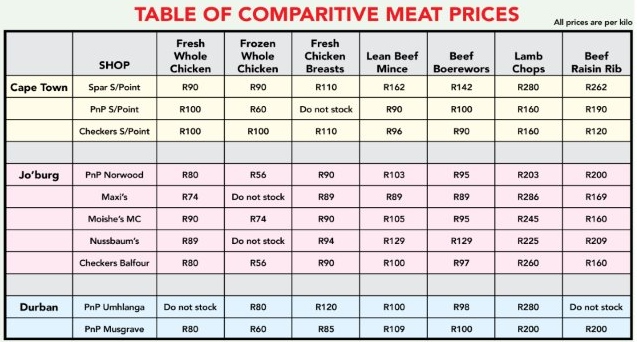ANT KATZ
Johannesburg butchers agree that the prices may be higher here than in the Cape on certain items, but they ascribe that to having to pay “much higher schechita fees”, say Max Klass and Trevor Wainer of Maxi’s. And the Johannesburg butchers claim they have higher overhead costs, too.
Both Maxis and Ian Lurie of Nussbaum’s, say another factor is that there is only one meat wholesaler servicing the Johannesburg kosher market.
However, the truth is that kosher chicken and red meat prices vary more widely from shop to shop within a city, than between cities. There are frequently specials and some careful price checking can result in substantial savings.
The Beth Din (BD) is in the final stages of compiling a long-awaited report on the costs of kashrut as a whole, according to Chief Rabbi Warren Goldstein. One of its main drivers has been Nando’s founder Robbie Brozin. The report is just weeks away from publication, he says,
The Jewish Report did an extensive survey around the country over the past week, checking the prices of meat to find out the facts.
We found that chicken – fresh, frozen and breast-portions – is cheapest in Johannesburg by, in some cases, as much as R10 a kilo. The most expensive frozen and fresh chicken are from Checkers in Sea Point at R100 a kilo. At Maxis in Johannesburg, you can get fresh chicken at R74 a kilo and Pick n Pay in Norwood and Checkers in Balfour has frozen chicken at R56 a kilo.
Durban’s cheapest chicken is frozen at Pick n Pay Musgrave at R60 and their frozen chicken is the same as at Pick n Pay Umhlanga’s fresh chicken, which is R80. If you want to splash out on fresh chicken breasts, you will pay R85 at Musgrave and R120 a kilo at Umhlanga. In terms of breast, Cape Town is not far behind with R110 a kilo being an average.
Lean beef mince is cheaper and most expensive in Cape Town, depending where you shop and just how lean you want your meat. If you choose the Spar in Sea Point, you could pay a wopping R162 a kilo, but you could go to Pick n Pay in the same area and pay R90 for the same amount.
In Johannesburg, you pay anything from R89 a kilo at Maxi’s to R129 at Nussbaum’s for lean mince and in Durban, your mince will cost between R100 to R109 a kilo this week.
Boerewors prices vary hugely depending on quality and where you live, with the cheapest being at Maxi’s at R89 a kilo and the most expensive at R129 for the same amount from Nussbaum’s.
In Cape Town it also varies from R90 a kilo at Checkers in Sea Point to R142 for the same at the Spar in the same suburb. In Durban, you will pay an average of R99.
You pay a premium to have those delicious braai lamb chops, with the most expensive being from Maxi’s at R286 a kilo and the cheapest at Checkers and Pick n Pay in Cape Town at R160 for the same amount. While Cape Town is the cheapest, you will pay R280 at that Sea Point Spar.
In Johannesburg, the price varies from R203 at Pick n Pay Norwood to the very expensive Maxi’s chops. In Durban there is also a big difference between the Umhlanga (R280 a kilo) and Musgrave Pick n Pay (R200) prices.
For beef raisin rib roast you can pay anything from R262 a kilo at the Spar in Sea Point to R120, but the latter is a special that is on at Checkers in the same suburb. In Durban, you can only get it at Musgrave for R200 a kilo, while in Johannesburg, you will pay anything from R160 a kilo at Moishe’s and Checkers Balfour, to R209 at Nussbaum’s.
However, as most stores were at pains to point out, prices change from week to week depending on market prices and special offers.
Johannesburg and Cape Town have full service kosher butcheries, while Durban offers three outlets. Meat, however, is mobile and moves around the country – and even beyond our borders.
The kosher community waits with bated breath to read the forthcoming reports from the Beth Din, for only then will we have a qualified understanding of whether kashrut in South Africa is out of kilter. Maybe then the community will be able to find something else to occupy their dinner table chat.

Alan Rosen
May 4, 2017 at 6:15 pm
‘Why don’t you show this comparative pricing alongside a non kosher meat pricing from the same stores. Then we will have a real comparison. The animals originate from the same farms. The expenses occur from the abattoir to the table. The non kosher gets the hind quarters, which has the expensive cuts of the animal, with the least waste. ‘
beinash_beinash
May 5, 2017 at 1:06 pm
‘This is interesting but its accuracy needs to verified.
At the same time there is Kosher meat and poultry available from Cape Town in Johannesburg on a number of private initiatives that will debunk these numbers and leave the Kosher community more aghast – and indeed begging more answers to real questions’
Brandon
May 9, 2017 at 11:30 am
‘The Beth Din issuing a report on the cost of kashrut is about as useful as Coca Cola issuing a report on the effects on sugar in your diet.
The Beth Din is funded by kashrut fees.
The Beth Din and Chief Rabbi earn their salaries from the costs of kashrut.
This report cannot by definition be independent or relied upon.’